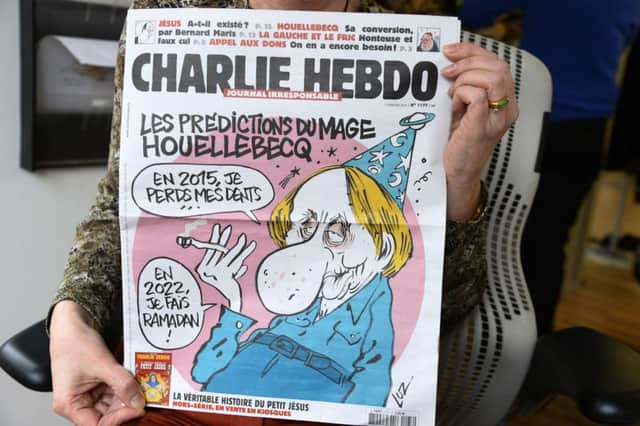Charlie Hebdo was in French satirical tradition


The new newspaper – which was named after the Charlie Brown Peanuts comics, as well as the French word hebdomadaire which means “weekly” – employed a large number of staff from the original magazine.
It ceased publication in 1981 due to a lack of funds – and readers – but was resurrected 11 years later.
Advertisement
Hide AdAdvertisement
Hide AdThe publication has long courted controversy, pushing the boundaries of satire to its limits.
Various religious figures, including the Pope and Orthodox Jews, have been the focus of the cartoonists’ satire.
One issue, in November 2011, was renamed Charia Hebdo and was “guest edited” by the Islamic prophet Muhammad, who was pictured on the front page with the caption: “100 lashes of the whip if you don’t die laughing.” It is considered blasphemous in most Islamic traditions to as much as make an image of the prophet Muhammad. The edition was due to be published on 3 November, but images of the front page had circulated online for a couple of days previously.
In the early hours of 2 November, the magazine’s offices were firebombed and its website hacked.
Mohammed Moussaoui, head of the French Council of the Muslim Faith, said at the time that his organisation deplores “the very mocking tone of the paper toward Islam and its prophet but reaffirms with force its total opposition to all acts and all forms of violence”.
Charlie Hebdo was forced to relocate its offices to the rue Nicolas-Appert in the 11th arrondissment of the French capital, where yesterday’s attack was carried out.
The firebomb incident, in which there were no injuries due to the time of day it was carried out, came six years after Danish newspaper Jyllands-Posten came under fire for publishing 12 editorial cartoons depicting Muhammad. The decision sparked protests across the world including violent demonstrations and riots in some Muslim countries.
Charlie Hebdo had subsequently re-published the cartoons after Jyllands-Posten, inside a cover entitled: “Muhammad overwhelmed by fundamentalists”, which included a cartoon of the Islamic figure weeping and saying: “It’s hard being loved by idiots.”
Advertisement
Hide AdAdvertisement
Hide AdIn February 2007, several Muslim groups took Charlie Hebdo to court for publicly “insulting” Islam, but the courts ruled to uphold editor Philippe Val’s right to satirise Islamic extremism.
The magazine is part of a long-standing French tradition for satire, which began in the times of Marie-Antoinette when scandal sheets denounced the queen in the run-up to the French Revolution.